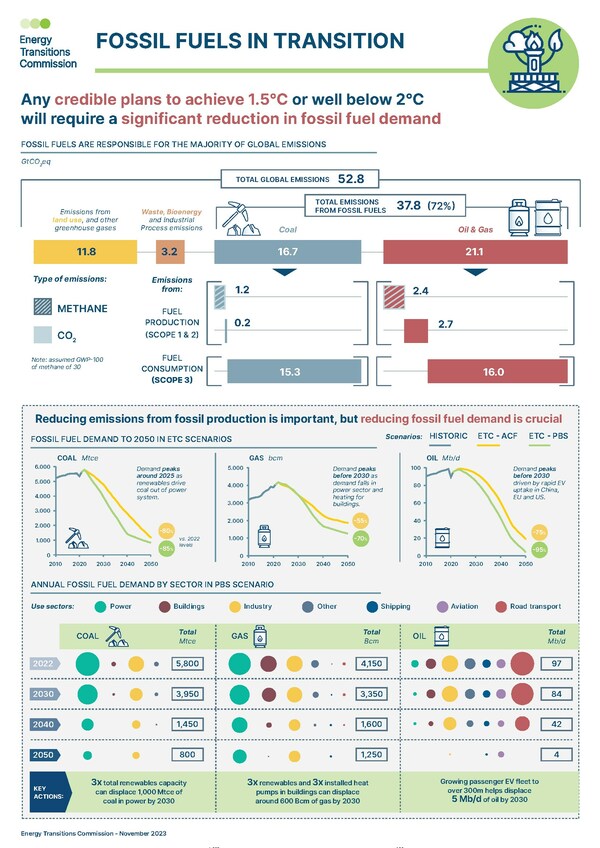LONDON, Nov. 16, 2023 /PRNewswire/ -- A new report by the Energy Transitions Commission (ETC), Fossil Fuels in Transition: Committing to the phase-down of all fossil fuels, says that use of coal, oil and gas must be reduced dramatically by 2050, with reductions starting now.
Unless fossil fuel emissions are reduced to net-zero by mid-century, it will be impossible to meet the targets set out in the COP21 Paris Agreement. Time is running out to achieve these targets. COP28 must therefore gain global agreement to the rapid phase-down in the demand for and supply of all fossil fuels.
Cutting fossil fuel supply and demand – not just making fossil fuel production less emissions-intensive
Fossil fuel-related emissions amount to about 38 Gt of CO2e,1 of which 6 Gt result from the production, transport, and processing of fossil fuels. These "scope 1 and 2 emissions" can and must be rapidly reduced with CO2 emitted down 55% by 2030, and methane from oil and gas operations down 70% by that date.
But over 80% of fossil-related emissions (~31.5 Gt in 2022) result from the combustion of fossil fuels in use. It is therefore also essential to rapidly phase down the demand for and supply of all fossil fuels. By 2050, coal use can and must fall around 80-85% from 2022 levels, gas by 55-70%, and oil by 75-95%. And this reduction can and must start now, with coal use needing to decrease around 15-30% by 2030, gas by 15-20% and oil by 5-15%.
"Any serious strategy to address the challenge of climate change must include commitments to run down the use and supply of fossil fuels. Dramatic cuts in scope 1 and 2 emissions are of course vitally important but if that is all that is agreed at COP28, it will be far short of what is needed to limit global warming to 1.5°C or even to 1.7°C," stated Adair Turner, Chair, Energy Transitions Commission.
Technological development makes rapid progress possible – but stronger policies are still needed
The report argues that this reduction of fossil fuel use is technically and economically feasible, since key technologies (such as renewables, batteries, EVs and heat pumps) are progressing faster than anticipated and already displacing fossil fuel demand in many regions; pathways to achieve near total decarbonisation of all sectors of the economy (including heavy industry and long-distance transport) are now clear.
As a result, fossil fuel use will soon start falling in several sectors. For example, passenger EV sales are likely to reach around 15 million (20% of the global market) in 2023 and approach 40% of total passenger vehicle sales in China.2 Oil demand in road transport will start falling soon and could be down by 40%-60% by 2040.
But fast enough reductions to limit global warming to 1.5°C, or even to 1.7°C, will require significantly stronger policy support to speed up the deployment of zero-carbon technologies and supporting infrastructure. These should include carbon pricing, support for new technology deployment and bans on the sale of new fossil fuel assets beyond specific dates, such as internal combustion engines or fossil-based boilers.
CCUS and removals are vital but do not mean business as usual
Carbon capture, utilisation and storage will be required to achieve decarbonisation in some sectors where alternatives are not available or not cost-competitive (e.g., cement), but total CCUS volumes in 2050 will be limited to around 4 Gt per annum. Dramatic reductions in fossil fuel use will need to be combined with about 150 Gt of additional cumulative carbon dioxide removals if global warming is to be limited to 1.5°C, but these must be in addition to, not instead of, fossil fuel demand reduction.
The possibility of CCUS and removals cannot be used to justify business as usual for fossil fuel production. It is not prudent or credible to assume significantly higher CCUS and removals. Scenarios which assume higher volumes to justify maintained fossil fuel production are not compatible with meeting climate objectives.
"CCUS and carbon removals cannot be used to justify business as usual fossil fuel production. Some CCUS and removals are required to achieve net-zero emissions and limit global warming to 1.5°C - playing a vital, but limited, complementary role alongside zero-carbon electricity, clean hydrogen and the use of sustainable low-carbon bioresources. They must be deployed as well as, not instead of, rapid reduction in fossil fuels use," said Ita Kettleborough, Director, Energy Transitions Commission.
Decrease investment in fossil fuel supply
The report shows that if the world is to limit global warming to 1.5°C, 65% of all oil and gas reserves and 90% of all coal reserves must be left in the ground. Any national strategy which assumes that all fossil fuel reserves must be exploited is incompatible with limiting global warming to safe levels, and there is no need for any exploration of new oil and gas fields.
As a result, investment in fossil fuel supply must dramatically decline, falling around 30-35% by 2030 and 45-65% by 2040. Some very limited development of existing oil and gas fields is needed to meet short-term demand but much less than companies and countries are currently planning for.
"We have the key technologies for the net zero transition and, as this report shows, they are now being rapidly deployed; peak demand for fossil fuels is in sight. This lays bare the real risks to those still banking on a fossil fuel future. Conversely, it demonstrates our greatest opportunity is to invest in those with transition plans for a clean energy future. To meet their net-zero and Paris Agreement commitments, it is vital that governments set clear policy and regulation focused on reducing demand for fossil fuels and providing the enabling infrastructure. The more credible and predictable climate policies are, the more investors will finance in anticipation, creating a virtuous circle of large-scale investment, faster decarbonisation, more jobs, and faster growth." said Mark Carney, UN Special Envoy for Climate Action and Finance.
Key Recommendations:
1. COP28 should gain global commitment to the rapid phase-down of fossil fuel use, and to ensure that any remaining fossil fuel use by mid-century is fully offset by CCUS and carbon removals.
2. Governments should;
a. Put in place policies to drive down fossil fuel demand at least in line with the scenarios set out in this report.
b. Reject the idea that all national fossil fuel reserves should be exploited.
c. Refuse approval for any expansion of coal mining capacity.
d. Restrict new oil and gas supply development of existing fields to small and appropriate levels.
3. All fossil fuel companies should commit to reaching net-zero scope 1, 2 and 3 emissions by mid-century (i.e. phasing out all unabated fossil fuel use by mid-century) and should commit to achieving a large part of this from a run-down of fossil fuel production.
4. Financial institutions should cease financing any coal developments or expansions, and very tightly restrict the financing of short-term oil and gas development. They should commit to reducing "financed emissions" in line with the pace required to limit global warming to 1.5°C.
"As world leaders prepare to convene at COP28, businesses of all sizes across sectors and regions are sending a clear market signal through the Fossil to Clean campaign that we must address the primary cause of climate change: burning fossil fuels. They are taking action to switch from fossil fuels to clean solutions, and calling for bold policy leadership to phase out fossil fuels and transition to a global clean energy system," said María Mendiluce, CEO, We Mean Business Coalition.
"Fossil Fuels in Transition" has been developed in collaboration with ETC members from across industry, financial institutions and environmental advocacy. The ETC is a global coalition of leaders from across the energy landscape committed to achieving net-zero emissions by mid-century whose members include ArcelorMittal, bp, HSBC, Iberdrola, RMI, Shell plc, SSAB, Tata Steel, Vattenfall, Volvo, Worley, We Mean Business Coalition, World Resources Institute and Ørsted.
This report constitutes a collective view of the Energy Transitions Commission. Members of the ETC endorse the general thrust of the arguments made in this report but should not be taken as agreeing with every finding or recommendation. The institutions with which the Commissioners are affiliated have not been asked to formally endorse the report.
Notes to editors
1 In 2022, fossil fuel production, transport and use resulted in 34.2 Gt of CO2 emissions and 124 Mt of methane (CH4) emissions. The CO2 equivalent effect of methane depends on the time period considered, with a multiplier of 30 applicable over a 100-year period, but 82.5 times over a 20-year period. 124Mt of methane is equivalent to 3.7GT of CO2 on the 100 year basis, and total fossil related emissions thus 37.9 (34.2+3.7) on this basis. Source: IPCC (2021), Climate Change 2021: The Physical Science Basis. Contribution of Working Group I to the Sixth Assessment Report of the Intergovernmental Panel on Climate Change.
2 BNEF (2023), Long-term electric vehicle outlook.
 Pages you might like
Pages you might like




 Today's topic
Today's topic







 Latest information
Latest information
 Follow official account
Follow official account
 Online support
Online support
 鄂ICP备2022017323号
鄂ICP备2022017323号
 鄂公网安备 42018502006493
鄂公网安备 42018502006493
 Launch Exhibition
Launch Exhibition
 Release information
Release information

















